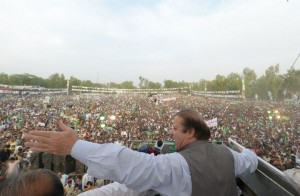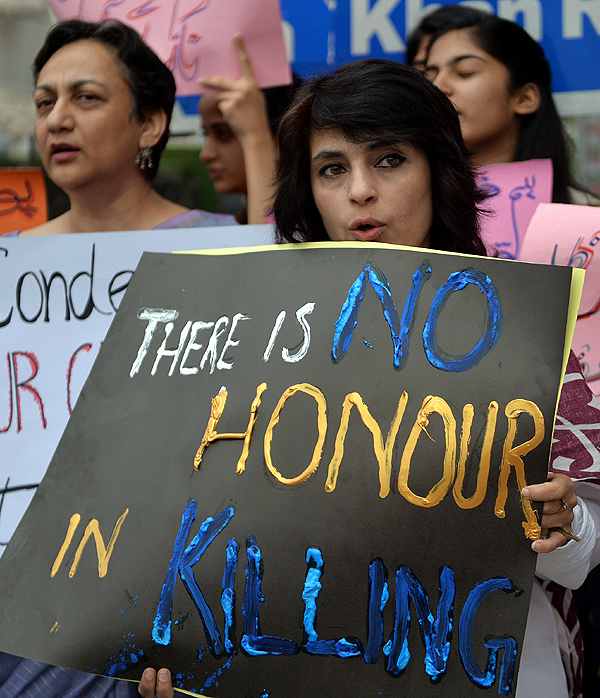Nawaz Sharif expects to win a third spell as prime minister: Economist
Monday, April 29th, 2013 11:02:03 by Tahir Khan
Polls put Nawaz Sharif, twice prime minister in the 1990s, comfortably ahead, prestigious magazine The Economist has said in its analysis.
Referring to a survey in February gave Sharif’s Pakistan Muslim League or PML (N) a whopping 59% share.
“The brothers Sharif have a decent record on getting things done. In Lahore alone, a bus system set up last year was opened in January; officials nearly eradicated dengue in 2012; and Mr Sharif built a motorway to Islamabad, the capital, in the 1990s. Such tangible schemes are popular. Business likes the brothers, too”.
It helps that most other parties are stumbling. A splinter from the Muslim League, known as PML (Q), has all but collapsed. It was a vehicle for General Pervez Musharraf, the general who toppled Mr Sharif as prime minister in a coup in 1999.
Now it is Mr Musharraf’s turn to suffer, as his return from self-imposed exile becomes a fiasco. He arrived to lacklustre effect in March. Courts barred him as unsuitable to contest any election. Then he was arrested on April 19th over the illegal sacking of judges when he ran the country. His high-walled farmhouse on the edge of Islamabad has become his jail. Mr Sharif presumably relishes every moment.
Nationally, the ruling Pakistan Peoples Party (PPP) is weak. Its five years in office were dismal; it held on only because Mr Sharif, establishing a principle of “friendly opposition”, refused to join efforts to topple it. It failed to enact economic reforms and left urban voters fuming over power cuts, rising prices and worsening violence.
Its figurehead, Asif Ali Zardari, who was propelled into office after the murder of his wife, Benazir Bhutto, is widely despised as corrupt, isolated and ineffective. In any case, as the country’s president, he is barred from campaigning. Thus the PPP is in effect leaderless: its chairman is his 24-year-old son, who is said to be too fearful of assassination to meet any voters.
Yet the PPP will not be wiped out. It may get some 60 seats, out of 272, almost all from Sindh province. Rural voters are loyal; an anti-poverty scheme named after Bhutto gives 1,000 rupees ($10) a month to poor households.
That leaves only one big potential obstacle for Mr Sharif: the emerging, populist force of Imran Khan, a charismatic ex-captain of Pakistan’s cricket team, who is adored by many, especially urban, young voters. Mr Khan talks of a “tsunami” washing away the old political parties—along with corruption, violence and misrule. A nonentity in the previous election, he now looks strong in parts of urban Punjab and Khyber Pakhtunkhwa in the north-west.
He has advantages. He is incorrupt, a taxpayer and his party alone practises internal democracy. Almost uniquely, Mr Khan holds big public rallies, as he did this week, because the Taliban (seeing him as soft on their cause) have let it be known they will not attack. The army is keen on fragmented party politics, which keeps civilians weak, and so welcomes new political actors. That also helps to explain the brief but intense flourish of Tahir ul Qadri, who marched on Islamabad in January, calling for cleaner party candidates.
But Mr Khan’s prospects are unclear. He disavows alliances with either the PPP or Mr Sharif’s League, so refuses “seat adjustment” deals in which two friendly parties agree not to split their vote against a stronger third opponent. Barring an unexpected sort of tidal wave, therefore, he will struggle to turn popularity into elected MPs. Most political analysts see him winning only a few more than 30 seats.
So Mr Sharif will probably be back, perhaps supported by a Karachi-based party, the Muttahida Qaumi Movement, MQM. Wisely, he is trying to use all his maturity and moderation to reassure the men in uniform. Much as he might be tempted to lash out at the army in revenge for the coup 14 years ago—say, by having Mr Musharraf humiliated—he needs first to encourage stability. (He also needs to strike a deal with the IMF quickly, to avoid a balance-of-payments crisis.)
Mr Sharif says he would not meddle in another crucial transition: General Ashfaq Kayani, the army’s chief of staff, is to retire in November. He says he would accept the most senior general eligible for the job. Yet other clashes may loom, for example over who runs foreign and security policy, on mending relations with India, or the excessive share of public spending grabbed by the armed forces.
Mr Sharif will influence assorted legislators when they pick a replacement for Mr Zardari, who steps down as head of state in September. And he will have an interest in who becomes chief justice, after the long-serving incumbent, Iftikhar Chaudhry—an activist in the extreme—retires in December. The elections mark just the start of a year of striking political change for Pakistan.
Tags: Asif Zaradri, Benazir Bhutto, Nawaz Sharif, PML-N, PML-Q, ppp, Shehbaz Sharif
Short URL: https://www.newspakistan.pk/?p=40070

















